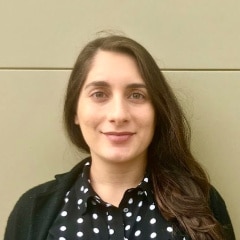2019 NAEd/SPENCER DISSERTATION FELLOWS ATTENDING 2020 ANNUAL MEETING
Amelia Farid, University of California, Berkeley
Amelia Farid is a doctoral candidate in the Graduate Group in Science and Mathematics Education (SESAME) at the University of California, Berkeley. Her research centers on reconciling dichotomies – both theoretical and pedagogical – between mathematics learning as engagement in disciplinary practices (such as proving, problem solving, and defining) and mathematics learning as developing conceptual understanding of rich content. Taking a design-based research approach, her dissertation uses both qualitative and quantitative methods to explore the ways in which mathematical practices of constructing, refining, and using definitions can be leveraged to develop content knowledge of fraction arithmetic, and vice versa. Her work is informed by her experience teaching mathematics at the secondary and tertiary levels, in both formal and informal settings in China, Colombia, and the United States. She has also contributed to the development of robust mathematics curricula aimed at the progress of rural communities in Latin America with the Foundation for the Application and Teaching of the Sciences (FUNDAEC). As part of her dissertation work, she has mentored a number of undergraduate researchers in educational research theory and methodology. Amelia holds a B.A. in mathematics from Columbia University and an M.A. in mathematics from the University of California, Berkeley.

Relations between Disciplinary Practices and Conceptual Understanding in Mathematics: Leveraging Definitional Practices to Support Students’ Fraction Understanding
Student understanding of arithmetical operations with fractions is foundational to success in mathematics, yet the domain is notoriously hard-to-learn and hard to teach. At the same time, documents like the Common Core State Standards in Mathematics point to student engagement in disciplinary practices as important components of learning. I argue that students may benefit from engaging with disciplinary practices, like constructing, refining and using definitions of foundational mathematical ideas, toward conceptual understanding and vice versa. In my dissertation research, I use a design-based research approach to support students in a productive dialectic between their development of mathematical practices of defining and their development of conceptual understanding of fraction arithmetic. To understand this dialectic, I study and contrast 9th grade and undergraduate students’ participation in an intervention in which they posit and refine of mathematical definitions related to fractions. Mixed methods analyses aim to illuminate the micro-processes by which conceptual understanding and disciplinary practices mutually support each other in student activity, as well as to uncover the effects of the intervention, both on students’ conceptual understanding and definitional practice. Beyond contributing to productive instructional approaches for developing conceptual understanding of a critical and foundational mathematical domain, the research will help us better understand the coherence between mathematical content and practice goals — goals that are emphasized but often treated as distinct in instructional standards and educational research.
Carly Robinson, Harvard University

A Ph.D. Candidate at Harvard University’s Graduate School of Education, Carly Robinson’s research program sits at the intersection of social psychology, education, and policy. She focuses on shifting consequential beliefs within students’ support systems to mobilize behaviors that help students. For example, she has helped shift parental beliefs about what “average” attendance patterns look like to encourage parents to get their children to school more often. Currently, Carly is developing and testing interventions that target teachers’ and parents’ beliefs to improve student academic and motivational outcomes. These interventions shift teachers’ beliefs about their classroom practices to promote positive teacher-student relationships and parents’ beliefs about their role to help them more effectively engage in their children’s education. Additionally, her methodological work emphasizes open science practices, such as preregistering hypothesis-testing studies. Carly’s research has been covered by various news outlets including the New York Times, The Boston Globe, The Hechinger Report, and Education Week. She has also helped communicate her findings to a wide range of educator- and general-public audiences through writing for the Shanker Institute, EducationNext, Digital Promise, and appearances on podcasts such as CPRE’s Research Minutes and NPR’s Hidden Brain. A former New York City teacher, Carly received a B.A. in Psychology from Williams College and a Master’s in Applied Positive Psychology from the University of Pennsylvania.
I Believe I Can Connect: Improving Teacher-Student Relationships by Targeting Teachers’ Relational Self-Efficacy Beliefs
Unequivocally, students with more positive teacher-student relationships attain countless more desirable outcomes than students with less positive relationships. But, cultivating positive relationships is not easy. We all have worried we will not be able to connect with new people or get a relationship back on track after a conflict. Teacher-student relationships, in particular, pose unique challenges: teachers and students are assigned to each other more or less at random each year, their power differential is exacerbated by an age gap, and teachers have to evaluate students. Despite these challenges, teachers rarely receive training or support on how to cultivate positive teacher-student relationships. Thus, it is completely reasonable that teachers may lack confidence in their ability to develop and maintain these consequential relationships with students.
Research on self-efficacy shows that people’s beliefs about their ability in a domain impact their performance in that domain, yet no one has studied teachers’ confidence in their relationship building skills with students. In my dissertation, I introduce the concept of teachers’ relational self-efficacy, which I define as teachers’ beliefs about their capability to successfully form, maintain, and repair relationships with students. My theory-driven research addresses the policy- and practitioner-relevant question of how we can improve teacher-student relationships in the classroom. First, through a longitudinal study, I provide evidence that we can measure teachers’ relational self-efficacy and that it predicts subsequent teacher and student perceptions of the teacher-student relationship, as well as a constellation of other valued student outcomes. Then, I experimentally test an intervention that increases teachers’ relational self-efficacy and measure the downstream impact on teacher-student relationships and student achievement.
